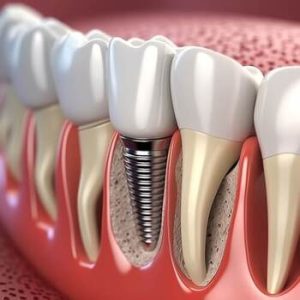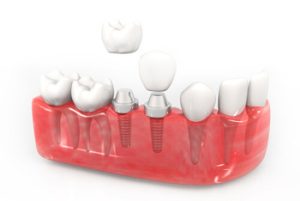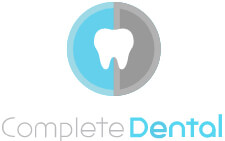Oral health is vital to overall well-being, and missing teeth can significantly impact one’s quality of life. Dental implants solve this problem, providing a stable and natural-looking replacement for lost or missing teeth. In this blog, we delve into the world of dental implants in Australia, particularly focusing on the cost of a single tooth implant.
Dental implants are a revolutionary step in dental care, especially regarding tooth replacement options. Unlike dental bridges or dentures, a dental implant involves a surgical procedure where a titanium implant is placed in the jaw bone, effectively replacing the root of the missing tooth. This is followed by a period of healing and bone grafting, if necessary, before the placement of a dental crown, giving you a new tooth with a natural appearance.
This comprehensive guide explores various facets of the dental implant procedure, from the initial consultation to the final implant placement. We will discuss the dental implant costs in Australia, factors influencing these costs like bone loss, the need for additional procedures like bone grafts or sinus lifts, and the impact of dental health insurance benefits. Additionally, we delve into the improved oral health benefits that dental implants offer compared to other tooth replacement options like dental bridges or dentures.
Understanding the cost factors, the dental implant operation process and the benefits of choosing a single dental implant for tooth replacement will empower you with the information you need to make an informed decision. Whether considering a single tooth implant or multiple implants or weighing up between a single implant and an implant-supported bridge, this blog aims to provide an accurate cost estimate and a clear understanding of what to expect during the dental implant process.
Understanding Dental Implants
Dental implants are:
- A state-of-the-art solution for replacing missing teeth.
- Offering a blend of durability.
- Functionality.
- Aesthetic appeal.

Compared to other tooth replacement options like bridges or dentures, dental implants stand out for preserving jawbone health and maintaining the integrity of adjacent teeth. Unlike bridges, which rely on neighbouring teeth for support, dental implants are independent and do not put additional strain on other teeth. Furthermore, implants offer a more natural appearance and improved oral health benefits.
The cost of dental implants in Australia, particularly for a single tooth implant, varies depending on several factors, including the need for additional procedures like bone grafting or sinus lifts. The initial cost might be higher than other options like dental bridges or dentures, but the long-term benefits often justify the investment. Dental health insurance may cover a portion of the expense, making it a more accessible option for many patients.
Undergoing dental implant surgery involves a meticulous procedure, typically performed by a dental professional. The process may include tooth extraction, bone grafting (if necessary), implant placement, and fitting the abutment and crown. Recovery and osseointegration (integration of the implant with the bone) take time, necessitating patience and care from the patient.
Given the complexity of the process and the variation in individual cases, it’s important to consult with a dental practice to get an accurate cost estimate. They can provide:
- A detailed breakdown.
- Consider the number of implants required, whether a single implant or more.
- Any additional procedures are needed for the best outcome.
The Need for Dental Implants
Tooth loss is an issue that many face due to various reasons, including tooth decay, gum disease, or injury. This loss affects the natural appearance and functionality of one’s teeth and leads to more profound impacts on oral health and overall quality of life. A missing tooth can lead to bone loss in the jaw, misalignment of adjacent teeth, and even changes in facial structure over time.
Dental implants, particularly single-tooth implants, provide a comprehensive solution for these issues. Unlike dental bridges or dentures, which merely sit on the surface, a dental implant involves a surgical procedure where a titanium implant is placed directly into the jaw bone. This supports a dental crown, effectively replacing the missing tooth and maintaining the health of the jaw bone.
The cost of dental implants in Australia, including the single-tooth implant cost, reflects the complexity and effectiveness of this dental procedure. While initially more costly than other tooth replacement options, dental implants offer long-term benefits. They prevent bone loss, maintain the alignment of surrounding teeth, and restore the natural appearance and functionality of the teeth. Additionally, dental health insurance benefits in Australia may help mitigate some of these costs, making this a viable option for many.
Detailed Breakdown of Implant Costs in Australia
In Australia, the cost of a single tooth implant can vary significantly, reflecting the complexity of this dental procedure. Generally, patients can expect to pay around AUD 3,000 for a single dental implant. This range includes the surgical placement of the implant, the abutment, and the crown.
Several factors contribute to the cost of dental implants. Firstly, the choice of materials plays a crucial role, with titanium implants being the most common and cost-effective. In contrast, zirconia implants, known for their aesthetic appeal, might be more expensive. The expertise and experience of the dental professional are also vital factors. Highly skilled and experienced dentists may charge more, but they often bring a higher success rate and better aesthetic results.
The location within Australia is another significant factor affecting costs. Typically, metropolitan areas like Sydney and Melbourne have higher dental treatment costs due to these cities’ increased overheads and living expenses. In contrast, regional areas offer more affordable prices, but patients’ travel expenses could offset this.
Furthermore, additional procedures can impact the total cost. For instance, if bone grafting or sinus lifts are required to strengthen the jawbone before implant placement, this will add to the expense. It’s also important to consider the costs of any preliminary treatments, such as tooth extraction or treatment of gum disease.
Comparing costs across different regions, patients might find that dental practices in cities like Brisbane and Perth offer competitive pricing, possibly due to the lower cost of living and operational expenses compared to Sydney or Melbourne. However, the variation is based on more than just geography, the specific dental practice, and the dentist’s expertise.
Patients should also explore dental health insurance benefits, as some policies may cover some of the cost, particularly if the implant procedure is medically necessary. Getting an accurate cost estimate from a dental practice is advisable, considering all the additional procedures needed for a successful implant.
The Dental Implant Procedure
The journey to restore a missing tooth with a dental implant is a meticulous and sophisticated process. Understanding the dental implant procedure is crucial for anyone considering this option for tooth replacement. In Australia, the single-tooth implant cost reflects the complexity and efficacy of this procedure, which is detailed step-by-step below.
-

- Tooth Extraction (If Necessary): If the damaged or decayed tooth is still present, it must be extracted before proceeding with the implant.
- Bone Grafting (If Required): In cases of significant bone loss in the jaw, a bone graft may be necessary to provide a solid foundation for the implant.
- Implant Placement: The dental implant surgery involves inserting a titanium implant into the jaw bone. This part of the procedure is crucial for the stability of the implant.
- Healing and Osseointegration: A healing period is required, typically ranging from a few months to half a year after implant placement. During this time, the implant integrates with the jaw bone – a process known as osseointegration.
- Abutment Placement: Once the implant has fused with the bone, an abutment, which will hold the dental crown, is placed.
- Dental Crown Placement: The final step is the placement of the dental crown, providing the appearance of a natural tooth.
The number of visits and duration of the dental implant procedure can vary based on individual cases and the need for additional procedures like bone grafts or sinus lifts. Post-procedure care is essential for recovery and includes maintaining oral hygiene and regular check-ups.
The cost of dental implants in Australia, including the single-tooth implant cost, can be influenced by the complexity of the case and the need for additional procedures. Dental health insurance benefits may provide some financial relief in this regard. The result is a functional, natural-looking tooth, restoring oral health and the confidence of a complete smile.
Factors Influencing the Cost of Dental Implants
The journey to restoring your smile with dental implants involves various factors that can influence the overall cost. In Australia, understanding these variables can help you plan effectively for this important investment in your dental health.
Detailed Examination of Cost Variables
The cost of dental implants is not a one-size-fits-all figure. It varies depending on the quality of the implant materials, such as the titanium implant and the dental crown, and the complexity of the dental implant operation. Additionally, lab fees for custom-fabricating these parts significantly affect the overall expense.
Additional Procedures Affecting Cost
A single-tooth implant cost can escalate if additional dental procedures are required. For instance, if you have experienced bone loss in the jaw or have conditions like gum disease, your dental professional might recommend a bone graft or a sinus lift. These procedures, essential for ensuring the stability and longevity of the implant, can significantly add to the overall cost.
Insurance and Financing Options
Navigating the realm of dental health insurance benefits in Australia is crucial when considering the cost of dental implants. While insurance may not cover the entire cost of a dental implant procedure, it might contribute to a portion of it, especially for necessary procedures like tooth extraction or bone grafting. Understanding your insurance coverage and exploring financing options like dental payment plans or healthcare credit services can relieve the immediate financial burden.
Ultimately, the cost of dental implants in Australia is influenced by various factors, including the quality of materials, the necessity for additional dental procedures, and the specifics of dental insurance and financing options. When considering dental implants, whether it’s a single implant, a straight tooth implant placement, or more complex solutions like implant-supported bridges, it’s vital to have a detailed consultation with your dental professional. They can provide an accurate cost estimate, discuss tooth replacement options, and guide you through the process, ensuring your journey towards improved oral health and a natural appearance is well-informed and within your financial reach.
Benefits and Risks of Dental Implants
Dental implants, widely acknowledged for their effectiveness in replacing missing teeth, offer substantial long-term benefits. They provide a permanent solution for missing teeth, ensuring improved oral health and functionality. Unlike dental bridges or dentures, implants preserve natural teeth by preventing bone loss in the jaw and maintaining the structure of adjacent teeth. They also offer a natural appearance, blending seamlessly with your existing teeth.

Choosing a qualified and experienced dental professional is paramount to mitigate these risks. A skilled dentist will conduct a thorough evaluation, including assessing the health of the jawbone and surrounding teeth, to determine the suitability of dental implants. They will also ensure that the implant procedure is performed with the utmost precision and care.
While an important factor, the cost should not overshadow the importance of selecting a dentist with the necessary expertise and track record. Investing in quality dental care can significantly reduce the risk of complications and ensure the longevity and effectiveness of dental implants.
Conclusion
In conclusion, this blog has explored the comprehensive journey of obtaining a dental implant in Australia, specifically focusing on the cost of single-tooth implants. Dental implants stand out as a robust solution for missing teeth, offering benefits beyond the aesthetic. They provide a functional restoration that mimics natural teeth, maintaining oral health and jaw bone integrity.
The cost of dental implants, including the single tooth implant, may initially seem high. However, the investment becomes worthwhile when considering the long-term benefits, such as improved oral health, prevention of bone loss, and the maintenance of the natural alignment of adjacent teeth. Additionally, dental health insurance in Australia may offer some coverage, reducing the financial burden.
The dental implant procedure, from the initial consultation to the final dental crown placement, is a complex yet highly effective process. It involves several stages, including potential tooth extraction, bone grafting, and meticulous surgical procedures. Each step is crucial to ensure the success and longevity of the implant.
We encourage those considering dental implants to seek personalised advice from a dental professional. An accurate cost estimate, tailored to individual needs and circumstances, can only be provided after a thorough examination. Dental implants, with their ability to replace missing teeth and offer a solution that closely resembles natural teeth, represent a significant advancement in dental care and are worth considering for anyone looking to restore their smile. For personalised advice and expert care in dental implants, visit Complete Dental. Our experienced team is ready to guide you through your dental journey. Call us on (07) 5235 8199 or (07) 3801 6503 for a consultation and embark on the path to a healthier, more confident smile.
Note: Any surgical or invasive procedure carries risks. Before proceeding, you should seek a second opinion from an appropriately qualified health practitioner.
References:
https://www.dentalhealth.org/Blog/dental-implants-and-how-crucial-replacing-teeth-really-is
https://www.verywellhealth.com/what-to-expect-during-a-dental-implant-procedure-1059372
https://www.ncbi.nlm.nih.gov/pmc/articles/PMC6854267/
https://www.realself.com/surgical/dental-implants
https://www.webmd.com/oral-health/guide-expectations-dental-implants









